Over 30 years of anarchist writing from Ireland listed under hundreds of topics
1916
Remembering 1916 Together: Anarchist Perspectives - video from #DABF 2016
A century ago, an armed insurrection took place in Ireland to end British rule and to establish an independent Irish Republic. The 1916 Rising was soon accompanied by major popular revolts against World War One across Europe and later emulated by anti-colonial movements across the Global South.
When it comes to remembering the 1916 Rising, why do conservative politicians and historians want to convince us that it would have been better for us if Pearse and Connolly had stayed at home? Why did the state parade lots of military equipment and personnel down O’Connell Street to mark the centenary? Why did so many people turn out to watch it?
This panel attempts to think through the meaning of 1916 for us today, and the politics at stake in how these events are remembered, forgotten, and mis-remembered.
Nationalism, socialism and partition
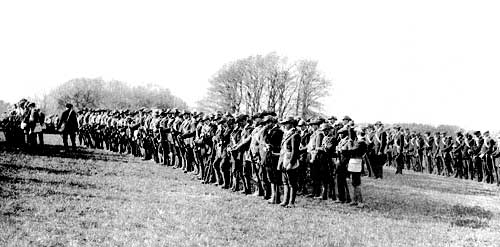 The period of Irish history from the 1880's to the 1920's defined and divided politics including socialist politics, on the island for the rest of the century. The most militant workers struggles occurred in the second half of that period, north and south, concentrated in the last five years. This was also the period of the 1916 insurrection in Dublin, the 1918-21 War of Independence, the treaty and partition of Ireland in 1921 and then in the south the bloody Civil War ending in 1923.
The period of Irish history from the 1880's to the 1920's defined and divided politics including socialist politics, on the island for the rest of the century. The most militant workers struggles occurred in the second half of that period, north and south, concentrated in the last five years. This was also the period of the 1916 insurrection in Dublin, the 1918-21 War of Independence, the treaty and partition of Ireland in 1921 and then in the south the bloody Civil War ending in 1923.
The year 1919 saw the greatest demonstration of the potential of Irish workers, north and south to take over the running of society but the events of the following years cemented the division that would do much to end workers militancy. In terms of working class struggle the periods of militancy of northern and southern workers coincide. Yet the working class was divided and these struggles remained almost completely isolated from each other. (Image: UVF training in 1914)
1916 - Connolly, blood sacrifice and defeating British imperialism
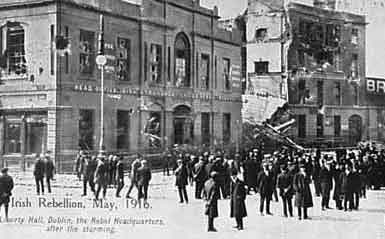 At 11.30 in the morning of April 24 1916 Bugler William Oman, a member of a syndicalist workers militia the Irish Citizen Army (ICA), sounded the 'fall-in' outside his union headquarters. This was the start of an insurrection in Dublin which was to see around 1,500 armed men and women seize key buildings throughout the city, and to hold these positions against thousands of British Army soldiers for almost a week. In the course of putting down the insurrection, 1351 people were killed or severely wounded and 179 buildings in the city centre were destroyed.(1)
At 11.30 in the morning of April 24 1916 Bugler William Oman, a member of a syndicalist workers militia the Irish Citizen Army (ICA), sounded the 'fall-in' outside his union headquarters. This was the start of an insurrection in Dublin which was to see around 1,500 armed men and women seize key buildings throughout the city, and to hold these positions against thousands of British Army soldiers for almost a week. In the course of putting down the insurrection, 1351 people were killed or severely wounded and 179 buildings in the city centre were destroyed.(1)
Image: Liberty hall after the rising
1916, left republicanism, anarchism and class struggle
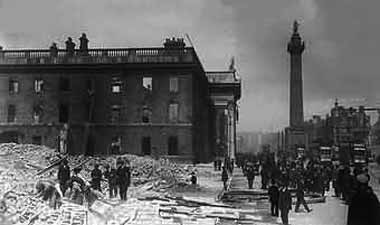 This article is an anarchist analysis of the 1916 insurrection and the war of independence in the context of the struggle for socialism in Ireland and internationally. It concentrates on the 'unknown' but intense class struggle that ran alongside the war of independence and the role republicanism played in the suppression of that struggle. It asks 'what is freedom' and shows how anarchism originated amongst earlier European left republicans as an answer to the limitations of republicanism.
This article is an anarchist analysis of the 1916 insurrection and the war of independence in the context of the struggle for socialism in Ireland and internationally. It concentrates on the 'unknown' but intense class struggle that ran alongside the war of independence and the role republicanism played in the suppression of that struggle. It asks 'what is freedom' and shows how anarchism originated amongst earlier European left republicans as an answer to the limitations of republicanism.
Image: O'Connell street after the insurrection
An anarchist look at the ideas of James Connolly - the single most important figure in the history of the Irish left
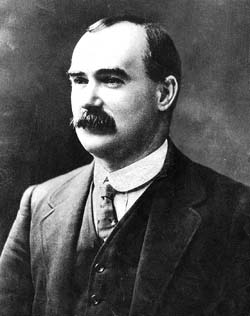 James Connolly is probably the single most important figure in the history of the Irish left. He was an organiser in the IWW in the USA but in Ireland is best known for his role in building the syndicalist phase of Irish union movement and for involving the armed defence body of that union, the Irish Citizens' Army in the 1916 nationalist insurrection. This left a legacy claimed at one time or another not only by all the Irish left parties but also by the nationalists of Fianna Fail and Sinn Fein. In this article I will attempt to look at the long neglected anarchistic aspects of Connolly's thought and ask the question was Connolly a libertarian?
James Connolly is probably the single most important figure in the history of the Irish left. He was an organiser in the IWW in the USA but in Ireland is best known for his role in building the syndicalist phase of Irish union movement and for involving the armed defence body of that union, the Irish Citizens' Army in the 1916 nationalist insurrection. This left a legacy claimed at one time or another not only by all the Irish left parties but also by the nationalists of Fianna Fail and Sinn Fein. In this article I will attempt to look at the long neglected anarchistic aspects of Connolly's thought and ask the question was Connolly a libertarian?
The Dublin Lock-out of 1913 and the ITGWU
In 1913 militant trade unionism had a tremendous task ahead of it. The poverty of manual workers was appalling. The death rate in Dublin, 27.6 per 1OOO, was as high as Calcutta's, The slums were the worst of any city in either Ireland or Britain. 20,108 families were recorded as living in a single room. An Irish Times editorial commenting on a report about Dublin housing wrote that "28,000 of our fellow citizens live in dwellings which even the Corporation admits to be unfit for human habitation. Nearly a third of our population so live that from dawn to dark and from dark to dawn it is without cleanliness, privacy or self respect. Sanitary conditions ruled out ordinary standards of savage morality''
Well that makes no sense - on the anti-choice 1916 beermats
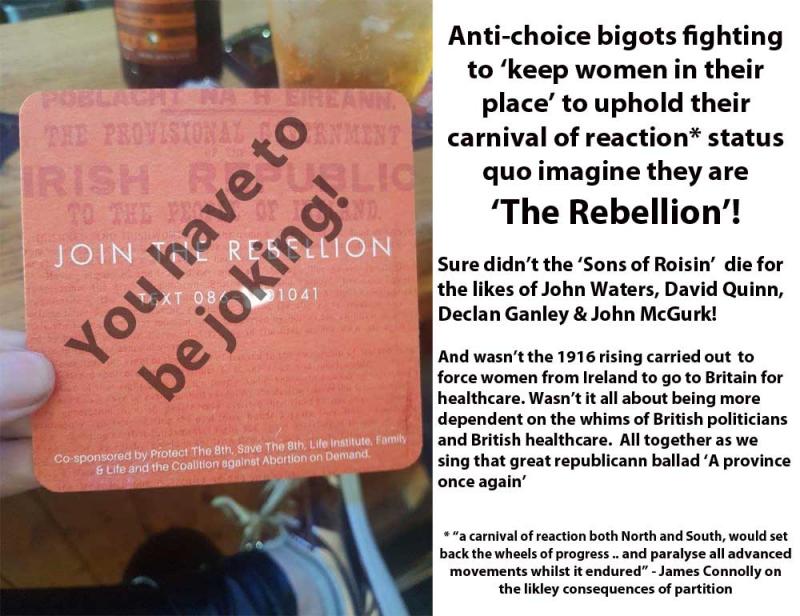 There are many strange things about the anti-choice bigots trying to protect the antiquated status quo of the 8th amendment - a piece of text inserted into the constitution at the moment when the power of that old clerical Ireland was about to crumble.
There are many strange things about the anti-choice bigots trying to protect the antiquated status quo of the 8th amendment - a piece of text inserted into the constitution at the moment when the power of that old clerical Ireland was about to crumble.
The Fenian Proclamation (1867) vs the 1916 Proclamation - the lost radicalism of Irish republicanism
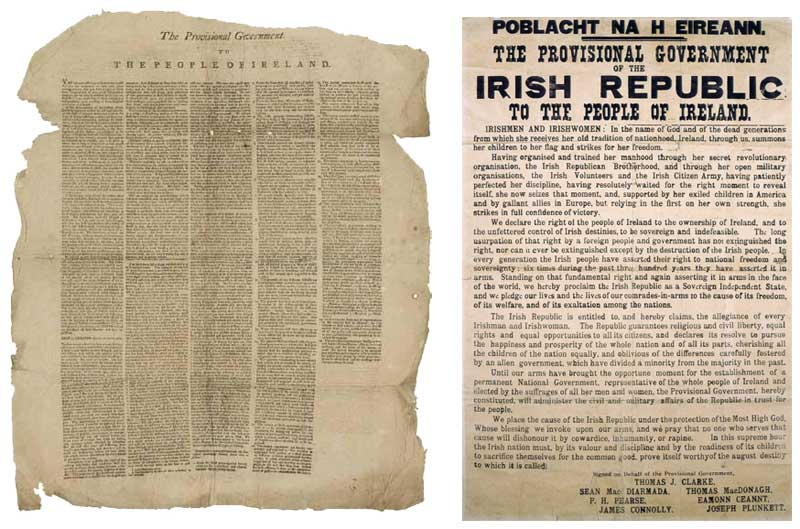 Considering the fact the Anarchist Communism as a coherent and easily transmutable ideology only came to be during the 1870’s and 1880’s the Fenian Proclamation of 1867 is striking in its progressiveness and clarity of thought. A product of the Irish Famine, English economic and military Imperialism in Ireland and a tradition of insurrectionary attempts against Imperialist rule, the original Fenians of 1867 should be viewed as proto socialistic in their values and analysis.
Considering the fact the Anarchist Communism as a coherent and easily transmutable ideology only came to be during the 1870’s and 1880’s the Fenian Proclamation of 1867 is striking in its progressiveness and clarity of thought. A product of the Irish Famine, English economic and military Imperialism in Ireland and a tradition of insurrectionary attempts against Imperialist rule, the original Fenians of 1867 should be viewed as proto socialistic in their values and analysis.
This is not to say they were Anarchists or close, they were most definitely Republican statists, who organised for an almost purely military strike against Imperialism, as opposed to the destruction of the state and working class/farmer self-activity for the destruction of exploitation and Imperialism and the creation of a cooperative society.
Dublin marks real anniversary of 1916 rising with peoples events on 24th April - photos & videos
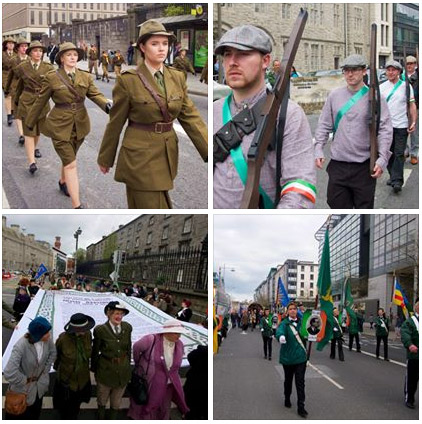 We spent the day of the 100th anniversary of the 1916 rising on the streets of Dublin recording the various peoples commemorative events. This was the actual anniversary on 24th April rather than the religious nationalist and state favoured date of the Easter weekend a month back.
We spent the day of the 100th anniversary of the 1916 rising on the streets of Dublin recording the various peoples commemorative events. This was the actual anniversary on 24th April rather than the religious nationalist and state favoured date of the Easter weekend a month back.
In a lot of ways this seperation was a very good thing as the state commemorations with its parades of soldiers and sealed off areas for dignitaries behind which hated politicians laid wreaths had little positive to be said about it.
Fire in the Minds of Irish Men and Irish Women - notes on the meaning of 1916 today
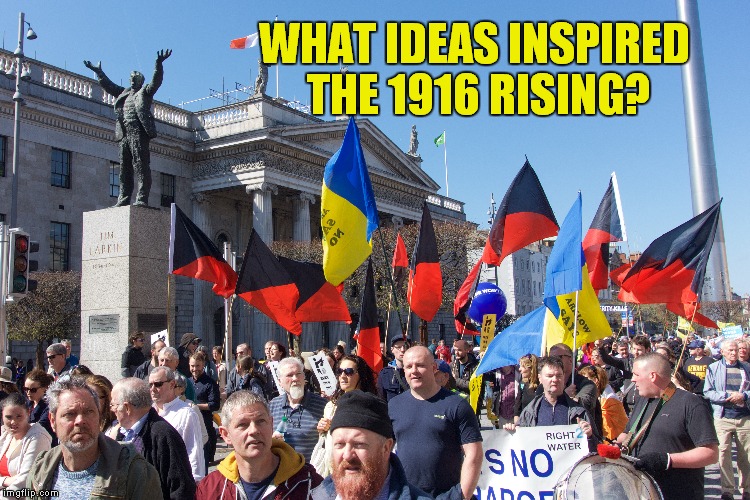 What ideas inspired the men and women who rose up in 1916? How did those ideas fare in the Irish Free State founded in 1922?
What ideas inspired the men and women who rose up in 1916? How did those ideas fare in the Irish Free State founded in 1922?

